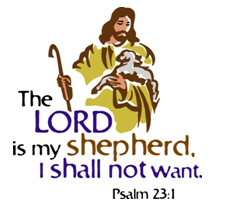Homily Yr B Easter 4,
April 29 2012, St. Albans
Readings: Acts 4.5-12; Ps 23; 1 Jn 3.16-24; Jn
10:10b-18
What do you want out of
life?
In today’s gospel reading,
Jesus promises us the very thing that we want out of life.
Jesus said, “I came that
they may have life and have it abundantly.
Now we may use different
words, and we might have different ideas of what abundance looks like, but we
want to live abundantly. We want to live
lives of energy and passion, we want to be joyful and connect with other people,
we want to live with purpose and meaning.
We want to have life and have it abundantly.
You know how I know
this? I know it because whenever people
want to get my attention, that’s what they promise me. They promise me abundance. Everybody promises me abundance. They appeal to my deepest human need and
desire. To have life and have it
abundantly.
Religious leaders do
it. Authors and publishers do it. Lifestyle coaches do it. Politicians do it. And perhaps most of all, advertisers do it.
We are bombarded by promises
of abundant living, because advertisers have figured out what it is we
want. They’ve done focus groups, they’ve
tested their messages and they know just what buttons to push. Advertisers have figured out that if they can
link their product with the promise of abundant living in our minds, then we’re
more likely to buy their stuff.
As some of you know, I watch
a lot of hockey on TV this time of year.
And you know what I’ve discovered recently. I’ve discovered that if I drink a certain
brand of beer, I’m likely to be surrounded by good looking energetic people
having lots of fun, people who like me and think that I’m cool. Now that’s a great promise!
This isn’t a new
phenomenon. Some of you might be old
enough to remember the Marlborough man.
Suave. Sophisticated. Rugged good looks. Probably does alright with the ladies. His own man.
A lot of people took up smoking because of the promise of abundance made
in ads like these. Problem is, it was a
lie. We know that now. But that doesn’t stop advertisers from making
the promise.
Maybe some of you are more
familiar with this one.
Now that looks like abundant
living doesn’t it? The energy, the
passion, the dancing for joy. Looking
pretty cool. All for you if you buy an
ipod.
I could go on. You know what I’m talking about. You’ve seen the ads, not just for cigarettes,
beer and ipods, but for cars and lottery tickets and razors and deodorant, all
of them promising that you can have life and have it abundantly.
And it works. Even though we’ve learned to be skeptical,
even though we know what’s going on, even though we know that the promise is a
lie, it still works, because it’s hard to resist someone or something that
promises us what we really, really want.
Life in all its abundance.
In today’s gospel, Jesus
makes us the same promise. “I came that
they may have life and have it abundantly.”
And then in a move that
would make an advertising expert nod in appreciation, he gives us an image. “I am the good shepherd”
Now the good shepherd is an
image that probably played better in rural Palestine 2000 years ago than it
does today in urban Ottawa. But it’s
still a powerful image mostly because it calls to mind a powerful psalm, Psalm
23, the psalm we heard this morning.
There was a recent survey done in North America which asked people which
was their favourite part of the Bible.
And the runaway winner was Psalm 23.
Yahweh is my shepherd, I
shall lack for nothing,
he makes me lie down in
green pastures.
Even when life throws its
worst at me,
I shall not be afraid, because
you are with me.
With you, my life will overflow
with goodness and compassion,
with banquets and feasting,
And I shall always belong, I
shall always have a home with you,
My whole life long.
This is how Jesus illustrates
his promise of abundance. He gives us a
picture of abundant living. And if you’re
like me, like those people who picked Psalm 23 as their favourite bit of
Scripture, this is a pretty good picture.
But again, if you’re like
me, you’re also going to ask the question, “How do we know that this promise is
true?”
And this is where Jesus goes
on to say something that departs from the happy optimism of most of the
promises of abundance that we encounter.
How do we know that Jesus can deliver on his promise? Jesus says, you’ll know I’m the good shepherd,
because the good shepherd is the one who lays down his life for the sheep.
At this point our
advertising executives are saying, “Whoa, time out. This laying down your life stuff isn’t going
to sell. Maybe we should do some focus
groups and find a better message.”
But obviously Jesus doesn’t
take their advice, because he goes on to repeat the bit about laying down his
life four more times in the next ten verses.
And then he does it. He lays down his life. He lays down his life in the incarnation,
when the God who created the heavens and the earth empties himself by taking on
human form and being born as an infant.
He lays down his life when he leaves his home and family to take up his
ministry in Galilee. He lays down his life
when he heals on the sabbath and eats with outcasts, breaking the laws and
bringing on himself the wrath of the authorities. He lays down his life when he’s in the garden
with his friends, and the soldiers come, and he steps forward and gives himself
up so that his friends can go free. He
lays down his life when he’s put to death on a cross.
So when this guy, this
Jesus, makes a promise, I pay attention.
He’s got credibility. He’s earned his
stripes. His promise of abundance, I
take it seriously.
But does it really
work? How does it work? How can I have that life that Jesus is
talking about, and have it in all its abundance?
Well, Jesus, the one who
promises abundant living gives his friends some advice. Call it a commandment if you like: Love one another, as I have loved you.
What does that look like? Does he mean we should be exchanging Hallmark
cards with love poetry written on the inside?
Are we supposed to develop some sort of intense feelings for each
other. No, Jesus is talking about love
as something much more concrete, much more action-oriented. John fleshes that out for us in his letter
which we read from this morning:
“We know love by this: that he laid down his life for us – and we
ought to lay down our lives for each other.”
You see, somehow the
abundant life that each of us craves, the abundance that advertisers tempt us
with, the abundance that Jesus promises, somehow that abundant life starts to
emerge when we start to lay down our lives for each other.
Laying down our lives for each
other.
What does that mean? We have the example of Jesus on the cross,
but to be honest that’s a hard one. There
are times and places where loving others might involve actually
risking death, but thankfully, that’s not the case for the majority of
us. So how can we, in our time and
place, make this a concrete reality. I’m
going to suggest that we take this idea of laying down our lives and move with it
in two different directions. The first
is the direction suggested by John in our first reading, and the second is a
way of picking up on some of what we talked about last Sunday.
John takes this commandment
to love by laying down our lives for each other and makes it concrete by turning
it into an imperative for justice and providing for those in need. “We know love by this, that he laid down his
life for us – and we ought to lay down our lives for one another,” John
writes. Then, immediately following, this: “And how does God’s love abide in anyone who
has the world’s goods and sees a brother and sister in need and yet refuses to
help?” We are called to justice. We are called to care for those in need. We are called to use what we have for the
good of others. If you want to live
abundantly, you have to give abundantly.
Laying down our lives for
one another is a call to justice, but it is also a call to vulnerability. Last week we talked about the power of
vulnerability. How God by adopting us as
his children thereby assures us that we are worthy of love and belonging. And how once we really believe that we are
worthy of love and belonging, we are enabled to live whole-heartedly, with
courage, allowing ourselves to be seen and known as we really are, embracing
vulnerability.
Embracing vulnerability is a
way in which we lay down our lives for one another. Embracing vulnerability is hard, it is a
laying down of one’s life, but as we reminded ourselves last week, it is also
the birthplace of joy, creativity, love and relationship.
And isn’t that what we
really mean by having life, and having it abundantly.
Amen.



No comments:
Post a Comment